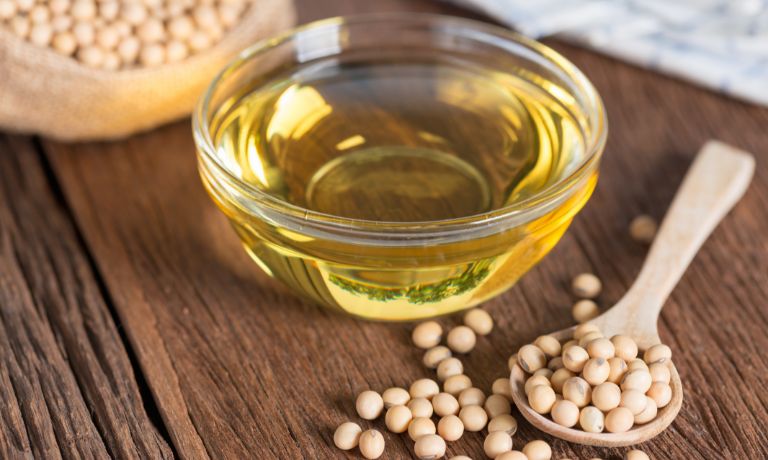Substitutes for safflower oil are widely available on the market and can provide a suitable option depending on your needs.
In this blog post, we’ll explore exactly what makes each substitute different from safflower oil.
We discuss their respective strengths and weaknesses, and finally provide our top picks for best alternatives.
What Is Safflower Oil?
Safflower oil is derived from the safflower plant, which is a member of the daisy family.
It has been used for centuries as a cooking oil and in traditional medicines to treat various ailments.
Its light flavor and high smoke point make it an excellent choice for stir-frying, baking, deep-frying, and even salad dressings.
It’s also a great source of essential fatty acids, including linoleic acid and oleic acid, as well as vitamins E and K.
When cooking with safflower oil, it is important to note that the flavor can quickly become overwhelming if you use too much.
As such, starting with a small amount is best and gradually increasing as needed.
For baking, safflower oil can be substituted for other types of oil in equal measure.
It can also be used in place of butter or margarine when making cakes or cookies.
For deep-frying, safflower oil is a great choice because of its high smoke point, meaning that it won’t burn at higher temperatures like some other cooking oils might.

Substitutes For Safflower Oil
Safflower oil is a versatile, healthy cooking oil with a high smoke point.
But if you don’t have access to safflower oil or prefer not to use it, several alternatives still offer health benefits and cooking versatility.
Sunflower Oil
Sunflower oil is a vegetable-based oil derived from the sunflower plant.
It’s commonly used for cooking and baking, as well as in cosmetics and topical applications.
Sunflower oil has a light flavor and light yellow color, making it an ideal choice for many culinary applications.
It is great for high-heat cooking, such as frying, and is also popular in baking.
Sunflower oil’s low smoke point makes it ideal for sautéing and stir-frying.
It can also be used as a salad dressing or added to smoothies for extra nutrition.
It also has a milder taste than safflower oil, so it won’t overwhelm dishes and recipes that require subtle flavors.
Sunflower oil is lower in saturated fats and higher in vitamin E than safflower oil, making it a more nutritious option.

Canola Oil
Canola oil, also known as rapeseed oil, is derived from a variety of the rapeseed plant.
It is one of the world’s most widely used cooking oils and has a mild flavor and light color that makes it suitable for many uses.
Additionally, it can withstand temperatures higher than many other cooking oils, making it a great choice for frying and sautéing.
When substituting canola oil in recipes that call for safflower oil, simply use the same amount of the latter as you would of the former.
Note that canola oil has a higher smoke point than safflower oil, so you may need to adjust your cooking temperature accordingly.

Soybean Oil
Soybean oil is a cooking oil derived from the seeds of the soybean plant.
It is one of the most widely used vegetable oils and has become popular for its light taste, low cost, and availability.
Soybean oil can be used either as a cooking oil or as an ingredient in many processed foods such as margarine and shortening.
Soybean oil has a lower saturated fat content than other vegetable oils and is rich in polyunsaturated fats.
These polyunsaturated fats are important for cardiovascular health.
In addition, soybean oil contains some vitamins and minerals, including vitamin E, that benefit overall health.
Soybean oil is also a great choice for those looking for an alternative to safflower oil as it does not have the strong flavor many find off-putting.

Olive Oil
Olive oil is derived from olives, the fruits of the Olea Europaea tree commonly found in the Mediterranean Basin.
It has numerous health benefits and is often substituted for other oils in cooking.
Olive oil contains monounsaturated fatty acids, which can help reduce bad cholesterol levels while increasing good cholesterol levels.
Compared to other vegetable oils, olive oil is low in saturated fat and rich in polyunsaturated fats, making it a healthier choice than safflower oil.
It also has a mild flavor that won’t overpower the flavor of other foods, making it perfect for baking or sautéing.

Vegetable Oil
Vegetable oil is a plant-based cooking oil that can be used as a substitute for safflower oil in many recipes.
Vegetable oil is typically made from seeds or nuts, like soybean, corn, sunflower, canola, and peanut oils.
Still, some versions may also contain other ingredients, such as palm and coconut oils.
Vegetable oil is a good alternative to safflower oil because it is generally less expensive and contains similar fatty acid profiles and other nutritional benefits.
It is also easier to find in stores because it is more widely available than safflower oil.
The significant difference between vegetable oils and safflower oil is the levels of essential fatty acids.
Some vegetable oils may be better suited to certain recipes than safflower oil, depending on the type and quantity of fat needed.

Hazelnut Oil
Hazelnut oil is a light, nutty-flavored vegetable oil made from hazelnuts.
It has a mild aroma and flavor and is often used in salads, dressings, baking, and cooking.
Hazelnut oil can be a great alternative to safflower oil because it contains healthy monounsaturated, polyunsaturated, and vitamin E.
Hazelnut oil also has a high smoke point (the temperature at which it begins to break down and smoke).
Hence, it’s great for cooking over medium-high heat or even deep-frying.
It is also relatively low in saturated fats compared to other vegetable oils, making it a healthier alternative.
As a result, this tasty oil can be used instead of safflower oil to add flavor and healthy fats to dishes while avoiding unhealthy saturated fats.

Coconut Oil
Coconut oil is a highly saturated edible oil extracted from the meat of ripe coconuts.
It’s popularly used in cooking, baking, and beauty products due to its many health benefits.
Coconut oil can be a substitute for safflower oil because it contains healthy fatty acids like lauric acid, capric acid, and vitamin E that benefit both cooking and beauty.
In addition to its health benefits, coconut oil has a high smoke point and is suitable for cooking at higher temperatures than safflower oil.
It also adds a unique flavor to dishes, making it a great choice for foodies exploring new flavors.

FAQs
Is Canola Oil Similar To Safflower Oil?
No, canola oil and safflower oil are different.
Canola oil is made from the rapeseed plant, while safflower oil is derived from the safflower.
Can Olive Oil Replace Safflower Oil?
Yes, olive oil can be used as a substitute for safflower oil in most recipes.
Olive oil has a lower smoke point than safflower oil but is still suitable for cooking at high temperatures.
Additionally, the flavor of olive oil is often more mild and subtle compared to safflower oil.
Can Vegetable Oil Replace Safflower Oil?
Yes, vegetable oil can be used as an alternative to safflower oil.
While safflower oil has a higher concentration of monounsaturated fatty acids, it is more expensive than vegetable oil and may not always be available.
Conclusion
The cooking oils mentioned above are all great options to substitute for safflower oil.
Each option has health benefits and unique flavors that make them suitable for different uses.
It is important to consider the smoke point, flavor, and cost when selecting an alternative oil, as each one may be better suited for certain dishes than others.
No matter which oil you choose, an alternative to safflower oil can help you add more flavor and nutrition to your recipes.
Try experimenting with the different options and find the best for you!

